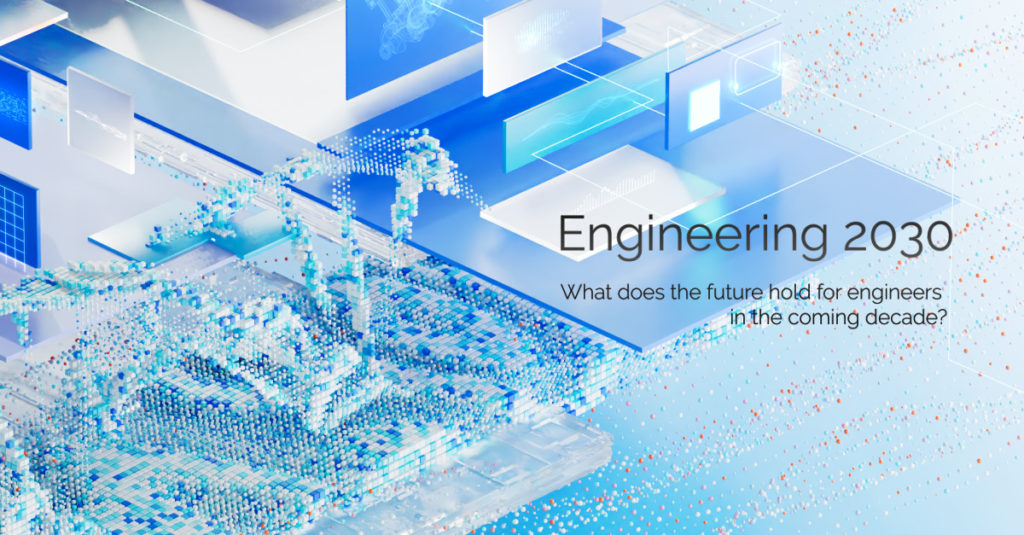How will engineering change in the future? Tools, technology and collaboration
Just like in all other sectors across the world, the engineering industry has been enjoying a return to in person conferences. During these events, much of the talk both on stage and in side-meetings, revolves around what the future of engineering might look like with many experts indicating that they believe hardware engineering, and the way that engineers work, will change much more in the next decade than it has done in the past 30 years.
Recently, Valispace CEO Marco Witzmann took part in Engineering 2030, an online discussion with other industry leaders to offer their own thoughts on how they see the future of engineering. Some of the key trends identified were:
Key trends for the future of engineering
- Breaking away from engineering legacy tools
- The future of team collaboration in engineering
- Single Source of Truth essential for engineering
- AI for engineering
Find some more information about these key trends below and discover why they will be important for the world of engineering and with accompanying clips from Engineering 2030 where these topics are talked about by the experts themselves.
Oliver Koch – Freelance Aerospace Engineer
Breaking Away from Engineering Legacy Tools
Although some of the complex hardware that engineers build today might feel like they’ve come from the future, oftentimes the tools and processes that they use to design these products are stuck in the past.
Panelist Oliver Koch, who’s an experienced freelance aerospace engineer, says that, “when I look back 20-30 years ago and now (at least in the aerospace industry) there’s not much of a difference. It’s still very much document orientated and we’re still working with these legacy tools. I think that’s a problem”.
If you compare this with the software industry – where the use of tools and repositories has drastically changed for the better and the sector in general has become more agile and focused on collaboration – the difference is stark. It seems like innovation in hardware tooling has stood still in comparison.
Oliver thinks this means that huge companies that were once on the cutting edge of technology, might soon become irrelevant. He said, ‘companies that were high-tech in the 1990’s have a huge legacy and they’re dragging something behind. It’s not easy to free themselves from that legacy but it’s required – from a tool point of view and from a mindset point of view. They need to go away from the old document orientated thinking.”
Marco Witzmann – Valispace CEO
Future of Team Collaboration in Engineering
The way that engineers work together has always been an important factor in ensuring that great products are built to a high standard. In the future though, to develop products that are more complex and to build them at a much faster pace that we see today, collaboration in engineering teams is going to play a bigger role.
At engineering 2030, Valispace CEO Marco Witzmann sees collaboration in the future as being about, “the whole team understanding the product (which gets more and more complex), collaborating to solve complex problems, it’s about knowledge sharing and knowing where information lies where but also which changes have been made and when”
Marco mentioned that improving engineering in the future may not be wholly defined by technological advances, but instead about the tools and processes that allow engineers to collaborate in a more agile way.
Sebastian Flugel – Project Leader of Innovation at EDAG
Single Source of Truth
The software industry has embraced the idea of Single Source of Truth in their workflows ever since Google decided to keep their entire codebase (with over a billion lines of code) in a single repository. Murmurings of the importance of a Single Source of Truth in complex hardware development are not necessarily new, but as Sebastian Flügel, Project leader of innovation at EDAG imagines, we will be talking about it in hardware development a lot more in the future.
“One goal we have is a Single Source of Truth” says Sebastian, “in all of our development processes we need to make them accessible to everyone who’s working on those processes and to understand what did my colleague do there. It’s very important.”
It’s clear that more and more engineers and thinkers in the hardware development space see a Single Source of Truth as vital in modernizing hardware projects, but how is this done in practice? Read this article about how to use a tool to implement a Single Source of Truth for your engineering data.
Mortiz Maier – ELISE Co-founder
Artificial Intelligence for Engineering
Artificial intelligence is often cited as the future saviour of many industries. Whether in software, logistics, automotive or any other sector you can think of, AI has a potential to ubiquitously improve the lives and work of human beings everywhere.
In fact, the ELISE co founder Mortiz Maier thinks that the use of artificial intelligence in engineering will become so normalized in the upcoming decade and that, “AI is just another tool that engineers will have to use in the future…it’s just a really interesting new tool. The good thing is, we can use it as engineers as we can either have the algorithms or we can also have the data available, this is something that is really necessary to think about.”
Bastien Schafer – Innovation Manager at Airbus
Using AI to Clean Engineering Data
Bastian Schäfer, innovation manager at Airbus, sees AI specifically as being useful for data cleaning and generative design. He says that, “using ai for tasks such as cleaning up this kind of data [3D data] is becoming super crucial, but in most cases we just do not have the data.” suggesting that as engineers’ ability to produce more data increases in the near future, our need to use AI to process it will increase too.
You can watch the full hour long discussion from ELISE with this link.


